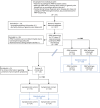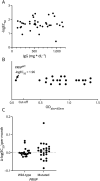Autoantibodies against the prion protein in individuals with PRNP mutations
- PMID: 32098855
- PMCID: PMC7682844
- DOI: 10.1212/WNL.0000000000009183
Autoantibodies against the prion protein in individuals with PRNP mutations
Abstract
Objective: To determine whether naturally occurring autoantibodies against the prion protein are present in individuals with genetic prion disease mutations and controls, and if so, whether they are protective against prion disease.
Methods: In this case-control study, we collected 124 blood samples from individuals with a variety of pathogenic PRNP mutations and 78 control individuals with a positive family history of genetic prion disease but lacking disease-associated PRNP mutations. Antibody reactivity was measured using an indirect ELISA for the detection of human immunoglobulin G1-4 antibodies against wild-type human prion protein. Multivariate linear regression models were constructed to analyze differences in autoantibody reactivity between (1) PRNP mutation carriers vs controls and (2) asymptomatic vs symptomatic PRNP mutation carriers. Robustness of results was examined in matched cohorts.
Results: We found that antibody reactivity was present in a subset of both PRNP mutation carriers and controls. Autoantibody levels were not influenced by PRNP mutation status or clinical manifestation of prion disease. Post hoc analyses showed anti-PrPC autoantibody titers to be independent of personal history of autoimmune disease and other immunologic disorders, as well as PRNP codon 129 polymorphism.
Conclusions: Pathogenic PRNP variants do not notably stimulate antibody-mediated anti-PrPC immunity. Anti-PrPC immunoglobulin G autoantibodies are not associated with the onset of prion disease. The presence of anti-PrPC autoantibodies in the general population without any disease-specific association suggests that relatively high titers of naturally occurring antibodies are well-tolerated.
Clinicaltrialsgov identifier: NCT02837705.
© 2020 American Academy of Neurology.
Figures


References
Publication types
MeSH terms
Substances
Associated data
Grants and funding
LinkOut - more resources
Full Text Sources
Other Literature Sources
Medical
Research Materials
